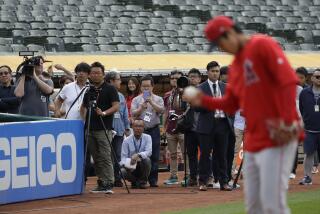Prince Takamado, 47; Japan Royal Sought ‘Normal’ Life
- Share via
TOKYO — Prince Takamado, a member of the Japanese royal family known for his love of sports and efforts to make the closeted imperial system more accessible to average Japanese, died Thursday. He was 47.
The prince, seventh in line to the throne and a cousin of the current emperor, collapsed while taking a squash lesson at the Canadian embassy. According to Japanese media reports, he slumped over around 4 p.m. and died several hours later of heart failure after his wife, Hisako, gave permission to have him taken off life support.
Takamado sought to forge some semblance of a normal life and to chip away at the institution’s highly restrictive traditions, stifling formality and micro-management -- a goal made easier by his position relatively far down the line of succession.
He took the subway, had a relatively regular job, enjoyed meeting people and was known for enjoying down-market restaurants and low-brow Japanese food such as steamed noodles and stir-fried pork washed down with a bit of Japanese alcohol.
“Our views sometimes differ with those of the Imperial Household Agency,” he told Takanori Kato, a palace reporter with the Yomiuri Shimbun. “But I’d get into trouble if I spoke about it.”
His position as honorary president of the Japan Football Assn. was a platform for a groundbreaking visit to South Korea for the opening ceremonies of the World Cup soccer finals six months ago, making him the first royal family member to travel there since the end of World War II.
During the trip, he went out of his way to praise South Korean hospitality, helping ease at least marginally the bitterness between the two countries arising from Japan’s 35-year occupation of Korea that ended in 1945. “Our two countries, so close geographically but often so far apart in other ways, are now becoming closer,” he told Koreans on a visit to a fish market in Pusan.
The visit came shortly on the heels of a courageous statement by Emperor Akihito that the imperial family likely traced its ancestry to Korea -- something often assumed by scholars but largely stifled by the watchful Household Agency.
Palace watchers say the prince’s everyman instincts were strengthened in part his three years studying psychology and music history in Canada, and his family position. His father as a younger man had bridled under the imperial restrictions as well, while his being the third son afforded him a bit more freedom.
“In Canada away from the glare of Japan he learned to be more of an ordinary guy, which he couldn’t do back home,” said Toshiaki Kawahara, an independent journalist.
More public duties fell on his shoulders in his 30s as illness befell his siblings. His eldest brother, Tomohito, was diagnosed with throat cancer a decade ago while the second son, Yoshihito, was confined to a wheelchair in the 1980s after a head injury.
Many Japanese, particularly younger people, welcomed his less formal approach. “He was such an ordinary guy that it was easy to forget he was part of the royal family,” said Chikako Fujiwara, a 31-year-old housewife. “I just thought of him as a cousin of the emperor.”
Takamado served for a time as a magazine columnist, and wrote regular newspaper dance reviews. He met his wife, Hisako, a commoner and English interpreter, after he noticed her in 1984 working at the palace and asked for an introduction. Four months later he proposed to her in English, making “Will you marry me?” one of the most popular English expressions with the public that year.
Takamado was, along with his wife, an avid collector of netsuke, small charm-like objects attached by string to tobacco pouches, kimono and other objects used from the 17th century to 19th century. He visited Southern California in 1997 to attend the opening of a netsuke exhibition at the Bowers Museum of Cultural Art in Santa Ana.
An avid sportsman, he loved soccer and played squash regularly.
He also played the cello, enjoyed music and served as president of Japan’s Amateur Musicians’ Assn.
A graduate of Tokyo’s Gakushuin University and Queen’s University in Canada, Takamado spent his entire working life at the Japan Foundation, a government-funded organization promoting international exchange.
Takamado is survived by his wife, Princess Hisako, and their three daughters.
More to Read
Sign up for Essential California
The most important California stories and recommendations in your inbox every morning.
You may occasionally receive promotional content from the Los Angeles Times.













